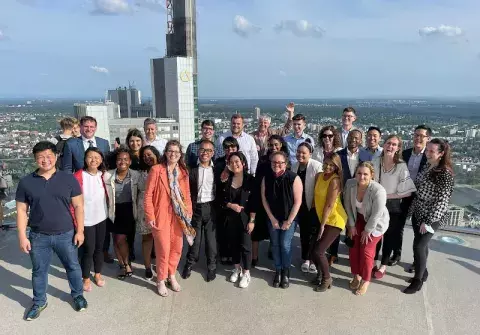Search
Leadership Development Program
Leadership Development Program

The Leadership Development Program at Johns Hopkins Carey Business School is a nine-month, 12-credit certificate program for all those looking to enhance their careers and join a vast alumni network across industries.
After more than a quarter-century of operations and with over 550 graduates to date, the Leadership Development Program offers a curriculum and enriched programming that have enabled aspiring individuals to expand their perspectives, build new strengths, and fully realize their leadership potential. Your courses and activities will propel your success both in business and in community settings.
Program details



Financial Aid & Scholarships
Program Features
Gain the skills and relationships to manage a rapidly diversifying global workforce. Realize your leadership potential with executive coaching, high-touch, interactive learning, and opportunities to immediately apply knowledge to your work.
Join a high-performing cohort and global network of alumni. Propel your success managing diverse teams in business and communities.
Scholarship opportunities
The Leadership Development Program offers opportunities for fellowships, full and partial scholarships. All applicants are automatically considered. No separate application required.
Earn your certificate in 9 months
With flexible and compact courses and residencies, complete the program in nine months while continuing to work full-time.
Transferable credits
Should you choose to continue your education at Carey, you can transfer credits earned through LDP into any one of the following programs:
Lifelong connections
In this cohort-based program, you’ll learn from your peers, collaborate on projects, and form lasting bonds. When you graduate, you’ll join a vast network of over 600 alumni across disciplines, fields, and industries.
-
- 33% female / 67% male
- 3.11 average undergraduate GPA
- 8.3 average years of full-time work experience
- 2 countries represented
- 33 average age
Curriculum
The depth of the Leadership Development Program experience involves two on-site residencies and online coursework (synchronous) between residencies. You will engage in discussions with corporate, government, and nonprofit leaders and work in teams on real-time entrepreneurship, business, and community-based projects. The Leadership Development Program curriculum features case studies and simulations, while exploring and integrating dimensions of leadership approaches and strategies applicable in the multicultural and multinational environment.
The latest edition of the Carey Business School University Catalog is available.
-
Certificate requirements
You are required to complete the graduate certificate in the Leadership Development Program in nine months. The certificate consists of six courses (12 total credits).
Required courses (12 credits):
- Accounting for Decision Making (two credits)
- Statistical Analysis (two credits)
- Marketing Management (two credits)
- Managing in a Diverse and Global World (two credits)
- Business and Leadership Communication (two credits)
- Leadership Theory into Practice (two credits)
-
- Before each residency, you will receive a reading package with pre-module homework, case studies, and exercises that are required to complete for partial credit toward the next residency.
- Post-residency work includes online coursework, case studies, personal and team initiatives/projects that you will complete to receive full credit for the residency.
Fall Residency: November 2 - 5, 2023 | Baltimore, MD
Spring Residency: April 4 - 7, 2024 | Washington, D.C.
Program comparison
- Online courses
- Two in-person residencies
- Transfer credits into specific Carey degree programs
- Complete certificate in nine months
- Online, flexible format
- Optional in-person experiences
- Asynchronous and/or fully synchronous courses
- Complete degree in two to three years
Alumni Spotlight
"It was an honor to be accepted into the first class of the Leadership Development Program. In addition to learning both soft and hard skills, I developed personal and professional relationships that are still important to me today. LDP helped lay the groundwork for my success at P&G, as the head of Marketing and Creative Services for a global humanitarian organization, and today, as the CEO of my own leadership coaching and nonprofit marketing communications consultancy. Thank you Hopkins and the LDP!"
—Cheryl Hudgins-Williams, CEO at Hudgins Williams Associates and Senior Consultant at Tecker International, Leadership Development Program ‘91
“[LDP was a] real turning point, an awakening of my aspirations and the feeling that I could, if I applied myself, rise to a senior management position."
—Tony Wells, chief brand officer for USAA, Leadership Development Program '97
Juan Torrico, Leadership Development Program, ‘04, is a digital marketing professional, documentary photographer, seasoned entrepreneur, and expert in the American Latino market. As the Founder and CEO of TorricoMedia, a digital media agency, he works with underrepresented entrepreneurs and influencers throughout the country to drive business outcomes and brand awareness for his clients.
-
Graduates have participated on Johns Hopkins teams that have regularly won and placed at Prospanica and National Black MBA Association student case competitions, finishing ahead of full-time MBA students from the nation’s leading programs. Graduates also have competed for and received National Black MBA Association scholarships, the Nathan Sanders Scholarship through the Executive Leadership Council, and National Association of Securities Professionals Fellowships.
Program participant employers have included:
- BGE
- The Boeing Company
- Deloitte
- Exelon
- IBM
- Intel Corporation
- Marriott International
- Pepsi Co.
- Stanley Black and Decker
- USAA
- Verizon
- The World Bank
Master of Science in Real Estate and Infrastructure (part-time)
Master of Science in Real Estate and Infrastructure (part-time)

Johns Hopkins Master’s in Real Estate and Infrastructure courses are taken within a true business school. Learn alongside students and faculty of different industries and backgrounds with like business mindsets, through the Edward St. John Real Estate Program. Build multidisciplinary skills that will help you thrive in and out of real estate, regardless of market conditions.
Johns Hopkins Carey Business School’s part-time Master of Science in Real Estate and Infrastructure program has been a leader in real estate education for more than 20 years. The flexible format provides working professionals with the option of remote live, synchronous courses to continue to maintain your career. Our innovative curriculum delivers additional flexibility in selecting courses for a customized focus on specific real estate topics including health care real estate, contemporary issues in the industry, and negotiation.
Program details
Financial Aid & Scholarships
Program Features
The part-time Master of Science in Real Estate and Infrastructure program is built upon the fundamental pillars of data, decisions, policy, and community. These pillars apply to commercial real estate professionals and entrepreneurs from entry- to executive level. This program will prepare you to both anticipate and influence the evolution of real estate in—and for—your community.
Networking opportunities
Leverage the power of our alumni network and create lasting connections with real estate professionals who are ready to help you build for what’s next.
Flexible format
The fully online, flexible format allows you to complete the program while continuing your personal and professional obligations. Create a schedule that works for you and customize your electives to align with your career goals.
Edward St. John Real Estate Program
Learn fresh, innovative approaches to the field of real estate development. This program is made possible through the generous support of Edward St. John.
Relevant, practical, and applicable
Study with a research-focused faculty and adjunct practitioners who are leading experts in their fields.
-
Real Estate and Infrastructure New York City Trek
Carey students, faculty, and staff from the Real Estate and Infrastructure program traveled to New York City in January 2024 for the Real Estate and Infrastructure annual experiential learning trek. The trip included visits to 3 World Trade Center, the New York Stock Exchange, and W.P. Carey for tours of the facilities. Read more“The New York City trip helped overcome the main challenge of being a part-time, remote student–connecting with other students, faculty, and staff. It was an added bonus to discuss things like electives. I left the trip feeling more connected to the school, faculty, and staff, with an even greater sense of pride in the program. The trip was well-organized, and I’m thankful for the opportunity to participate.”
– Bentley Sam '25, Manager, Real Estate at Norfolk Southern
-
- Collect, read, and analyze real estate data
- Understand zoning regulations and anticipate changes to land use laws
- Understand pertinent mega-trends and engage at the frontiers of real estate
- Influence the direction of development
- Build your personal and professional real estate network
-
- 38% female / 63% male
- 3.24 average undergraduate GPA
- 8.3 average years of full-time work experience
- 1 country represented
- 30 average age
With help from faculty experts, a curriculum focused on functional skills, and a hands-on learning experience, Chris Agorsor (Real Estate and Infrastructure ’17) was able to directly apply his skills from Carey to position his company to take on $2 billion in funds. Hear how the Real Estate and Infrastructure program prepared him.
Curriculum
For over 30 years, the Edward St. John Real Estate Program at Johns Hopkins Carey Business School has featured a powerful combination of research-focused faculty members and practitioners who are leading experts in their fields.
The latest edition of the Carey Business School University Catalog is available.
-
Our curriculum teaches key trends relevant to the real estate industry, its future leaders, and change agents.
Those trends include:
- Affordable housing
- Sustainability in real estate (green building, zero carbon, zero emissions)
- Climate resilience
- Financing (private equity, crowdfunding)
- Data (accessibility)
- Participatory governance
- Tax and regulation (regulatory changes to close loopholes)
Curriculum features:
- Core real estate classes and future-focused real estate electives
- Capstone project to apply classroom knowledge to real-world challenges
- Case studies in partnership with the Johns Hopkins alumni community, including companies like Fannie Mae, Angelo Gordon, and Hillwood Properties
- Experiential learning courses featuring a part-time internship with a local or national real estate firm
Fast Track Certifications:
- Argus
- CCIM
- LEED
- WELL
- Appraisal Institute
Required courses (16 credits):
Business Foundations (3 courses, 6 credits)
- BU.120.601 Business Communication
- BU.131.601 Business Leadership and Human Values
- BU.510.601 Statistical Analysis
Functional Core (5 courses, 10 credits)
- BU.245.790 Real Estate and Infrastructure Capstone
- BU.234.610 Real Estate and Infrastructure Finance
- BU.241.610 Real Estate Investment and Development
- BU.241.630 Real Estate Products and Emerging Trends
- NEW: The Legal and Public Policy Landscape of Real Estate
Electives courses (Choose 7 courses, 14 credits)*:
- BU.241.750 Advanced Valuation and Investment Analysis
- BU.152.740 CityLab Catalyst: Business Innovation for Social Impact
- BU.152.745 CityLab Practicum: Social Impact Project
- NEW: Corporate Real Estate
- BU.241.620 Design and Construction Feasibility
- BU.241.650 The Evolution of Housing, Property, and Public Finance Policy
- BU.241.725 Global Perspectives in Real Estate
- NEW: Health Care Real Estate
- BU.241.735 Infrastructure Development for Sustainable Cities
- BU.241.640 Net Zero Real Estate
- BU.121.610 Negotiation
- BU.241.740 Project Finance and Public-Private Infrastructure Delivery
- BU.242.720 Real Estate Capital Market Analysis
- BU.152.725 Real Estate Entrepreneurship
- BU.242.710 Real Estate Funds and Portfolio Management
- BU.242.701 Real Estate Investment Trusts: Analysis and Structuring
- BU.242.601 Real Estate Market Feasibility Study
- BU.450.740 Retail Analytics
- BU.241.705 Selected Topics in the Real Estate Industry
- BU.241.770 Smart Growth, Infrastructure and Real Estate Development
- BU.241.760 Strategic Commercial Leasing
- One Carey elective of your choice
*Not all electives are offered online each year. Consult with your academic advisor for more details.
Optional Residency
Participate in an optional residency of your choice to gain experience working alongside experts in the industry.
Program Comparison
- Fully online, 2 years
- Working professionals, career switchers, leadership development
- Optional residency of your choice
- Focus on alternative real estate, real estate infrastructure, finance, and sustainability
- Fully online, 2-6 years with optional in-person experiences
- Working professionals, career switchers, leadership development
- Broader business foundations in leadership, marketing, AI, finance, operations
- Customizable with choice of eight specializations
-
Gain hands-on experience and networking opportunities with Johns Hopkins alumni and experts in the industry.
Residencies typically feature:
- Conferences or summits on important real estate topics such as real estate health care, real estate technology (Prop tech), and community investing and affordable housing
- A visit with a city planning or economic development department to explore strategic planning, data collection and analysis, and how to connect urban planning with community macro issues (crime, employment, property values, health, etc.)
- Projects like preparing a plan for a failing development and presenting it to a planning department
Go beyond the classroom
Your business education doesn’t end in the classroom. Step out of your comfort zone as you partner with students across Johns Hopkins and businesses to take your learning to the next level.
-
Throughout your program and beyond, Carey career and leadership coaches and employer relations industry specialists provide you with the support, resources, and opportunities you need to achieve your unique career goals.
Explore career outcomes of our MS in Real Estate and Infrastructure alumni
- Acquisitions analyst for universal owners (endowments, foundations, sovereign wealth funds)
- Asset manager
- Associate for private equity
- Director of development - private sector
- Director of environmental social governance (ESG) for a real estate investment trust (REIT)
- Director of finance/development - public sector (county/state level)
- Loan originations and servicing
- Real estate development
- Real estate entrepreneurship
- Sales/leasing/property management for investors
Networking opportunities
Alumni from the Johns Hopkins Real Estate and Infrastructure program are a powerful and extensive network of 1,000+ members who want to help you succeed.
- Real Estate and Infrastructure Advisory Board: Members of the Real Estate and Infrastructure Advisory Board help continually evaluate and update our curriculum to account for the latest real estate trends. They also serve as guest speakers in the program to offer insights and networking opportunities from influential real estate practitioners at real estate firms.
- Alumni forum: The Johns Hopkins Carey Business School Real Estate Alumni Forum—known as Carey REAF—promotes and facilitates relationship building between students, alumni, faculty, Advisory Board members, and real estate industry leaders. The group holds educational and social events, and opens opportunities for events hosted by local, regional, and national real estate professional organizations.
Keep up to date with the MS Real Estate and Infrastructure program
- Quarterly JHU Real Estate Market Update Newsletter: A quarterly market report newsletter for our alumni, from leading commercial real estate firms about real estate finance, capital markets, and the real estate economy. (coming soon)
- What’s Next in Real Estate Speaker Series: An ongoing series focused on challenges, uncertainties, or innovations in the real estate industry. Dean Alex Triantis facilitates each event, featuring distinguished Carey alumni and industry leaders.
Attend an event
Carey Business School hosts various virtual admissions events for prospective students to meet with members of our admissions team. With virtual visits, informational online sessions, and regional and international events, the Carey team is ready to answer questions and support your business school journey.
Connect with a Carey student or alumni
Our students come from all over the world and represent all of the different graduate business programs we have here at Carey. Connect with one of them directly to learn more about life at Carey.
Q&A: COVID-19 poses risk to global supply chains
Flexible MBA Online Information Session
Carey researcher proposes safeguards for online consumers’ autonomy, privacy
Global Immersion
Global Immersion

Student Experience
Global Immersion

The Global Immersion program embeds students within foreign markets, exposing them firsthand to the most pressing challenges facing international businesses. These seven-day travel courses take students out of the classroom and into the heart of today’s biggest business questions, such as global health, Brexit, and the impact of technology in business, and more.
Typically held during the January Intersession, Spring Break, start of Summer term, or at the end of Summer term, Global Immersion is an intense, one-week, two-credit course, with some engagements held at a university abroad. Classroom work is supplemented with on-site visits to government offices and corporate partners. Students collaborate with business leaders to examine a particular industry problem from the businesses’ perspective. Students learn firsthand how businesses are adapting to emerging political developments and how political outcomes impact business decisions and strategy. Topics include technology, financial systems, health care systems, innovation, sustainability, and organizational management strategies, and social impact.
For students interested in a global immersion without the travel component, the Virtual Global Immersion is an opportunity to work on an international business challenge with graduate business students from an overseas partner institution. The 8-week Virtual Global Immersion is a cross-cultural collaboration that takes place entirely online via synchronous class sessions. These weekly synchronous sessions incorporate faculty lectures from each institution, cultural activities, virtual business site visits, and group project work to give students a truly international educational experience in which they learn firsthand from one another about the business culture in each of their respective countries.
Global Immersion Offerings
Chile—Business in Latin America: (BU.003.903.91)
Join us for a seven-day travel course examining business in Chile. Students will gain insight into Latin American business trends and opportunities. With a focus on sustainability and innovation, students will meet with government agencies, corporate businesses, and academic institutions to gain varied perspectives on Chile’s business and economy.
Date: January Intersession
Location: Santiago, Chile
Faculty: Luis Quintero, PhD
To participate in the Chile Global Immersion, students need to be prepared to graduate no earlier than the Spring term. Registration for January Intersession courses opens in April.
Virtual Global Immersion: Peru - Cross-Cultural Teaming on Business Challenges (BU.003.930.41)
In this eight-week Virtual Global Immersion, graduate students from both Carey and CENTRUM Pontificia Universidad Católica del Perú (PUCP) work together in cross-cultural teams on an international business challenge. At the start the course, the students from each school are introduced to their teammates and learn about the scope of the real-world business challenges they will tackle together. In preparation for their collaboration, the students are guided through effective multicultural team-building principles to create a team contract and develop their project work plan. Over the following weeks the students explore the variances between their respective countries’ business environments and share their own perspectives about the project topic. Lectures are delivered by faculty from each academic institution. Weekly synchronous class sessions include virtual business site visits, workshops, expert panels, and cultural enrichment activities to complement the intensive team project work.
Date: Spring, Term 1 (January - March)
Location: Online
Faculty: James Calvin, PhD
To participate in the Virtual Peru Global Immersion, students need to be prepared to graduate no earlier than the Spring term. Registration for Spring I courses opens in November.
Italy—Health Care in Europe: Models, Regulation & Business (BU.003.904.91)
In this global immersion, students will gain insights into European health care models and will analyze similarities and differences with U.S. models. They will explore the diverse landscape of public and private health care models in Europe, understand the regulatory aspects (both at the country and EU levels), and become acquainted with the business dynamics within the health care sector. Drawing from varied perspectives, such as government agencies, corporate businesses, health care providers and clinics, and/or academic institutions, students will develop a well-rounded view of different health care models in Europe. This course includes two pre-departure lectures (accessible remotely), with a week-long travel component in Milan, Italy (including a day-trip to Bologna).
Date: Spring Break
Location: Milan, Italy
Faculty: Mario Macis, PhD
To participate in the Italy Global Immersion, students need to be prepared to graduate no earlier than the Spring term. Registration for Spring I courses opens in November. Note that required travel for the Spring Break Immersion may conflict with some Spring 1 final exams.
UK—Technology & Society through a Behavioral Economics Lens (BU.003.906.91)
Does social media make us happier? Are hidden fees exploitative? Can online marketplaces mitigate discrimination? Using a behavioral economics lens, this course will explore how technology platforms impact our wellbeing. Through interactive panels, discussions, and hands-on project work, you will learn to apply insights from behavioral economics to understand and improve technology's societal implications. We will connect with tech companies, consulting firms, entrepreneurs, and policy leaders; with the UK Behavioural Insights Team – a leading behavioral policy organization – as a key course partner. Students are expected to actively participate throughout the course, to contribute to a thoughtful learning experience for the class as a whole, and to complete a group project during the trip proposing changes to a product or policy based on behavioral economics principles to enhance societal wellbeing. This course includes two pre-departure lectures (accessible remotely), with a week-long travel component in London, United Kingdom
Date: Spring Break
Location: London, United Kingdom
Faculty: Michael Luca, PhD
To participate in the UK Global Immersion, students need to be prepared to graduate no earlier than the Spring term. Registration for Spring I courses opens in November. Note that required travel for the Spring Break Immersion may conflict with some Spring 1 final exams.
Germany: Finance and Fintech in the EU (BU.003.911.91 & BU.003.916.91)
This course is offered to Carey Business School students interested in learning more about European financial markets, including the local fintech industry. It aims to develop in-depth knowledge of the European financial system through a partnership with the Frankfurt School of Finance and Management (FSFM). Both Carey Business School faculty and FSFM professors will provide classes on the history and current status of the financial system in Europe and compare those systems to the U.S. financial landscape. Activities will also be aimed at local fintech and startup industries. Corporate and government organization visits will complement lectures and case studies.
Date: Late May (Week after Spring II finals)
Location: Frankfurt School of Finance and Management (FSFM)
Faculty: Yuval Bar-Or, PhD
This course consists of two 1-credit co-requisites: BU.003.911.91 (1 credit) in Spring II and BU.003.916.91 (1 credit) in Summer.
To participate in the Germany Global Immersion, students need to be prepared to graduate no earlier than the Summer term. Registration for Spring II courses opens in November.
United Kingdom—Navigating Strategic Crises (BU.003.900.91)
Whether financial collapse, public health emergencies, infrastructure failure, or geopolitical tension, business leaders across all industries face a variety of risks that can quickly evolve into crises. Using recent events in both the United Kingdom and continental Europe as case studies, students in this course will sharpen their skills to manage effectively through a wide variety of challenging business situations. This immersion will consist of on-site visits and lectures with government agencies and corporate partners examining the UK’s finance, health care, and logistics industries. This course is open to 30 students.
Date: Late July (Week after Summer finals)
Location: London, United Kingdom
Faculty: Rick Smith, PhD
To participate in the United Kingdom Global Immersion, students need to be prepared to graduate no earlier than the Summer term. Registration for summer immersions open in March.
Peru—Community and Societal Impact (BU.003.907.91)
In this global immersion, students will gain insights into issues of international social and environmental impact, aligning with the United Nations’ 17 Sustainable Development Goals. The course aims to empower students to create positive changes in local businesses and communities while examining the role of social impact work in Peru. Students from Johns Hopkins Carey Business School will attend two synchronous, virtual pre-departure lecture sessions to begin working together on team projects related to community and social impact. Then they will travel to Lima, Peru, between Sunday, 3 August, to Saturday, 9 August 2025, to continue their project group work in person and to attend lectures with faculty from CENTRUM Pontificia Universidad Católica Del Perú (PUCP) Graduate Business School. They will also gain varied perspectives through site visits and presentations from government agencies, nonprofit organizations, and local businesses.
Date: Early August
Location: Lima, Peru
Faculty: James Calvin, PhD
To participate in the Peru Global Immersion, students need to be prepared to graduate no earlier than the Summer term. Registration for summer immersions open in March.
Navigating Innovation in India (BU.003.908.91)
This course offers students an immersive experience in India, a dynamic and rapidly growing economy. Students will explore the Indian innovation ecosystem, gaining insights into the unique consumer preferences, cultural nuances, and business practices that drive success in this diverse market. Through incubator and customer visits, guest lectures, and hands-on activities, students will deepen their understanding of how to navigate the complexities of doing business in India. The course culminates in an entrepreneurship challenge where students will pitch a startup idea—either a novel concept or an adaptation of a successful US model tailored to the Indian market. This experience will equip students with the knowledge and skills needed to thrive in a global business environment, particularly within the context of emerging markets.
Date: January Intersession (starting in 2026)
Location: Hyderabad, India
Faculty: Supriya Munshaw, PhD
To participate in the India Global Immersion, students need to be prepared to graduate no earlier than the Spring term. Registration for January Intersession courses opens in April. This course is intended to be offered every other year (next offered in January 2028).
Eligibility
To participate in these courses, students must be currently enrolled as a graduate student at Johns Hopkins Carey Business School with a minimum GPA of 3.0 and have completed 12 credits.*
*The 12-credit requirement can be waived, per course faculty approval, if students demonstrate significant industry experience in the subject matter or international business.
Enrollment varies per program, but is generally limited to 26 students with a minimum of 20 students. Tuition, international residency fees, and nonrefundable deposit are applicable to all students, regardless of status.
